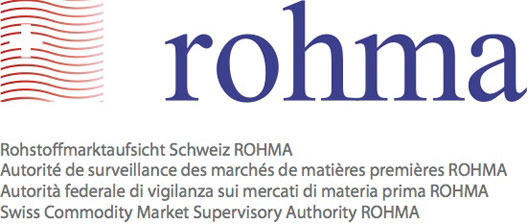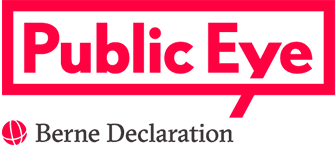As a state regulatory body, ROHMA is endowed with sovereign authority over commodity traders and other companies active within the commodities sector. One of ROHMA’s central objectives is to minimize the resource curse and to help developing countries rich in natural resources to mobilize themselves for their development and in the fight against poverty.
In order to achieve this, ROHMA supervises commodity companies’ internal risk-management and due diligence practices, as well as their activities. In particular, it is responsible for ensuring that the commodities traded through Switzerland are legitimately and fairly sourced, thereby maintaining Switzerland’s good reputation as a responsible market in which to operate. In addition, ROHMA also plays an important role in collating information received from the companies under its supervision and communicating publicly on the state of the commodity sector.
ROHMA grants operating licences to companies subject to its supervision. It ensures that supervised institutions comply with the relevant laws, ordinances, instructions and regulations, and continue to meet their licensing requirements. Where necessary and to the extent permitted under the law, ROHMA imposes sanctions, provides administrative assistance, and regulates. It plays a role in amending legislation and ordinances, issues circulars and, where competent, issues its own ordinances.
Supervision of commodities companies
The regulatory framework for supervision is provided in particular by the Commodity Market Supervisory Authority Act (CMSAA), the Commodities Act (CA), various pieces of supervisory legislation, and the associated implementing provisions and circulars. Supervisory activities are undertaken in order to ensure that companies do not deal in any way with commodities that are: illegal (e.g. stolen or pillaged); obtained illegally (e.g. through corrupt practices); obtained in violation of human rights norms (e.g. mined using child labour); obtained in violation of environmental norms (e.g. unacceptably high sulphur emissions from smelting); obtained contrary to internationally applicable trade sanctions; or obtained without due compensation being made to the people from whose country the commodities derive (i.e. misappropriation of public assets).
Once licensed, institutions are subject to ongoing supervision. This is to monitor continued compliance with licensing requirements and other statutory and regulatory requirements. In the event of shortcomings or breaches of these requirements, the company must take measures to rectify the situation, or face sanctions.
In order to ensure that they refrain from carrying out the prohibited activities, companies are required to carry out a variety of due diligence procedures. These are then checked in the first instance by industry-specific ROHMA-certified auditors, who then report to ROHMA. Further supervision ensures that companies meet their full disclosure requirements, refrain from engaging in aggressive tax avoidance or name-lending practices, and that they obtain the appropriate consents either to conduct business with politically-exposed persons or to trade in commodities obtained from conflict zones, failed states or occupied territories.
Risk Management
Resource-curse countries typically suffer from weak governance, extensive corruption, and may even be in the throes of conflict. This means that companies active in the commodity sector are particularly exposed to a variety of risks. In order to avoid those risks, companies subject to the ROHMA regime are required to implement specific due diligence processes. The Risk Management Department determines the due diligence requirements appropriate to the type of activity proposed to be undertaken by a company according, among other things, to the risks associated with that activity and its proposed geographical location.
The Risk Management Department supports all supervisory teams in activities relating to the assessment of these risks. It is responsible for the approval and on-going monitoring of the regulatory prerequisites underlying the due diligence processes. The aim of these processes is in particular to prevent companies trading in commodities that are: illegal; obtained illegally; obtained in violation of human rights norms; obtained in violation of environmental norms; obtained contrary to internationally applicable trade sanctions; or obtained without due compensation being made to the countries from where the commodities derive.
The Risk Management Department activity is also extensively involved in both national and international regulatory projects relating to the risk areas mentioned above. Regulatory projects that have risk management implications (e.g. further development of commodity laundering legislation) are coordinated internally with the supervisory groups and externally with the relevant units.
The Risk Management Department is made up of expert sub-groups specialising in particular risks. These include the Conflict Team, the Human Rights Team, the Environmental Standards Team, and the Political Persons and Corruption Team. Their main objectives are to scrutinise the business activities of the companies submitted to their oversight in order not only to ensure compliance with the particular conditions of their licenses, but also to work with those companies to help them identify problematic risks at an early stage.
At the international level, staff members in this group play an active role in developing and enhancing supervisory tools for companies operating in this high-risk segment.
Authorisation (licensing)
The authorisation procedure is one of the most important preventative control instruments in commodity market supervision. Dubious business practices, opaque ownership structures and doubtful individuals who fail to fulfil the conditions of proper business conduct must be consistently refused the quality seal of authorisation. Supervisory legislation provides varying licensing requirements, depending on the activities undertaken by the applicant company. Every licensing procedure begins with clarification as to whether an authorisation (license) is required or not. The core activity of the Licensing Department is the granting of new licences. In addition, existing licence holders must obtain prior approval from ROHMA for changes affecting the licensing requirements, for instance due to planned changes to the types of activities intended to be undertaken, or significant changes in the ownership. The section also handles applications for voluntary cessation of an activity subject to authorisation, as well as removal of licenses from companies who have failed to meet the conditions of their licenses.
Commodity-Related Crime
The Commodity-Related Crime Department is the ROHMA centre of competence for the prevention of commodity laundering, the prevention of trade in commodities that are sold as a means of financing conflict, the prevention of trade in commodities that have been obtained in violation of internationally accepted trade sanctions, and any other commodity-related crime. It serves as the point of contact for all areas of supervision. The section is responsible for the ongoing analysis of applicable anti-commodity laundering regulations and for taking appropriate steps to amend these where necessary. It is also active internationally. The section is also responsible within ROHMA for dealing with issues associated with commodity-related crime, such as the financing of conflict, corruption and the application of embargo provisions.
In the event that criminal behaviour has been identified by ROHMA, the Commodity-Related Crime Department is responsible for transferring all necessary information to the public prosecutor’s office for follow-up.
Audit Companies
The Audit Companies Department is responsible for the special statutory licensing of the audit companies that carry out industry-specific audits at all of the institutions supervised by ROHMA. In particular, ROHMA is responsible for checking that the technical requirements for auditing the supervised institutions are met. Audit companies that are licensed by ROHMA to carry out industry-specific audits have received specialist training enabling them to assess the appropriateness and effectiveness of the due diligence processes put in place by the companies they audit. They are the first to assess whether a company has complied with the provisions of the Commodities Act. The training also equips auditors to identify irregularities or other evidence that might indicate non-compliance or risky behaviour. ROHMA-certified auditors are not permitted to carry out any non-commodity related work for the companies they audit (e.g. tax work), and must disclose if any potential conflicts of interest exist that could lead to the perception of a biased result. The Audit Companies Department has the final say in whether a particular commodity sector auditor may carry out work for a particular company. In order to ensure complete independence, auditors may only work for a particular company for a maximum of five years in every fifteen.
In the event that ROHMA has reason to believe that a company has committed serious or persistent breaches of the law, ROHMA may carry out its own audit and/or conduct a more detailed investigation (see Enforcement).



